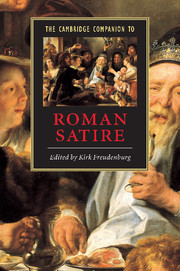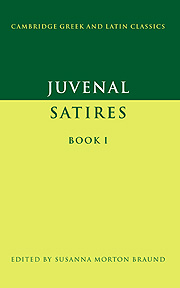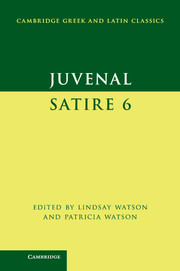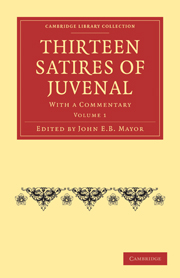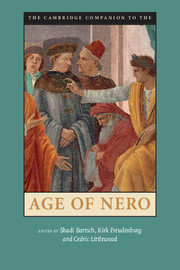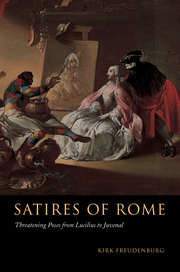
Satires of Rome
Threatening Poses from Lucilius to Juvenal
£39.99
- Author: Kirk Freudenburg, University of Illinois, Urbana-Champaign
- Date Published: October 2001
- availability: Available
- format: Paperback
- isbn: 9780521006217
£
39.99
Paperback
Other available formats:
Hardback, eBook
Looking for an inspection copy?
This title is not currently available on inspection
-
This survey of Roman satire locates its most salient possibilities and effects at the center of every Roman reader's cultural and political self-understanding. This book describes the genre's numerous shifts in focus and tone over several centuries (from Lucilius to Juvenal) not as mere 'generic adjustments' that reflect the personal preferences of its authors, but as separate chapters in a special, generically encoded story of Rome's lost, and much lionized, Republican identity. Freedom exists in performance in ancient Rome: it is a 'spoken' entity. As a result, satire's programmatic shifts, from 'open' to 'understated' to 'cryptic' and so on, can never be purely 'literary' and 'apolitical' in focus and/or tone. In Satires of Rome, Professor Freudenburg reads these shifts as the genre's unique way of staging and agonizing over a crisis in Roman identity. Satire's standard 'genre question' in this book becomes a question of the Roman self.
Read more- Was the first thorough study of the genre since 1976
- Written in a vigorous, engaging style
- Was theoretically adventurous at the time of publication
Reviews & endorsements
'No review can do full justice to the wealth of sophisticated and provocative ideas put forth in this volume with remarkable clarity of expression and unfailing wit'. Costas Panayotakis, Classical Review
See more reviews'Substantial interpretative claims, contrary to what we might call received opinion, but nonetheless convincing, underpin each chapter.' David Larmour, Classical Philology
'There are many good points to this book, not the least of which is its bold confrontation with standard accounts of satire that seek to smooth out the genre's glaring contradictions. By examining poetic failure rather than success, by focusing on the audience rather than the author, and by making us aware of what is lacking amid all the fullness, F. compels us to think differently about Roman satire and our readings of it. The overarching proposition that we can connect the anxiety about genre and self-expression visible in satire with broader crises in identity and self-formation among educated Romans of the early empire is entirely persuasive...This book is a substantial contribution to the scholarship on Roman satire and will be welcomed on that basis. The numerous question marks and underlinings in my own copy testify to the fact that it was at least a remarkably provocative read.' David Larmour, Classical Philology
'The specialist in Roman satire will … find some interesting ideas herein.' Classics Ireland
'Professor Freudenburg's book, yet another in the series devoted by scholars over the years to such a visibly important genre, is welcome … The book will clearly be useful in the modern seminar-room, where it should generate much animated discussion.' Comptes Rendus
Customer reviews
Not yet reviewed
Be the first to review
Review was not posted due to profanity
×Product details
- Date Published: October 2001
- format: Paperback
- isbn: 9780521006217
- length: 308 pages
- dimensions: 228 x 153 x 18 mm
- weight: 0.46kg
- availability: Available
Table of Contents
Introduction
1. Horace
2. Persius
3. Juvenal.
Sorry, this resource is locked
Please register or sign in to request access. If you are having problems accessing these resources please email [email protected]
Register Sign in» Proceed
You are now leaving the Cambridge University Press website. Your eBook purchase and download will be completed by our partner www.ebooks.com. Please see the permission section of the www.ebooks.com catalogue page for details of the print & copy limits on our eBooks.
Continue ×Are you sure you want to delete your account?
This cannot be undone.
Thank you for your feedback which will help us improve our service.
If you requested a response, we will make sure to get back to you shortly.
×
